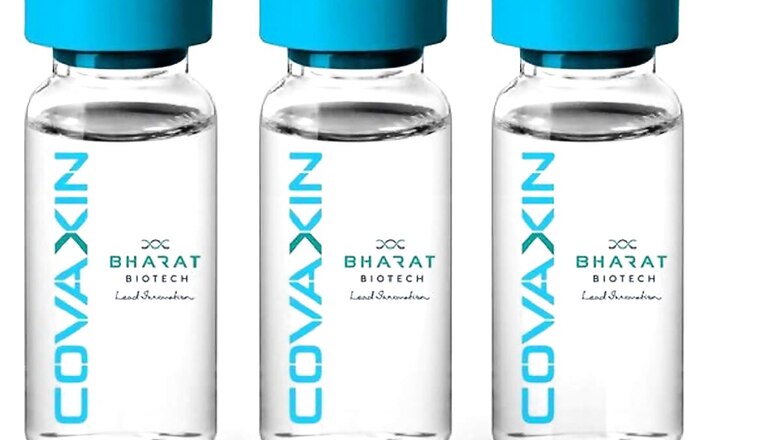
views
New Delhi: Bharat Biotech International Limited’s (BBIL) Covaxin was well tolerated and induced enhanced immune response with neutralising antibodies, preliminary data from Phase I trial to assess safety and immunogenicity published in British medical journal Lancet shows.
The inactivated vaccine, which has used particles of dead coronavirus, led to common side effects such as pain at injection site, headache, fatigue and fever and nausea, and one adverse event which the data showed was not associated with the trial group who got Covaxin.
Between July 13 and 30, 827 participants were screened and eventually 375 were enrolled after the rest did not qualify due to a variety of issues. Among those enrolled, 100 each were randomly assigned to three vaccine groups and 75 were randomly assigned to the control or placebo arm of the trial. The vaccine groups received three different formulations of the vaccine.
During the trials, conducted at 11 sites in India, the second dose of the vaccine was administered 14 days apart. Later, when the Phase III trials began in early November to test the vaccine’s efficacy the gap between the first and second dose was kept at 28 days to elicit enhanced immune response in building immunity.
The key assessment in the Phase I trial was of the safety and reactogenicity and preliminary assessment of immune response against SARS-CoV-2. Participants were observed for two hours after vaccination to assess reactogenicity, and were instructed to record local and systemic reactions at seven day intervals (days 0-7 and days 14-21) after vaccination using a diary card.
Solicited local adverse events were pain at the injection site and swelling, and systemic adverse events, including fever, fatigue or malaise, myalgia, body aches, headaches, nausea or vomiting, anorexia, chills, generalised rash, and diarrhoea. All unsolicited adverse events were reported by participants throughout the study.
“The vaccine was well tolerated in all dose groups with no vaccine-related serious adverse events. Both humoral and cell-mediated responses were observed in the recipients of the Algel-IMDG-based vaccines,” the study published in Lancet said.
Following vaccination, the IgG antibody titres or levels against the virus spike protein, receptor-binding domain and nucleocapsid protein increased after each dose of the vaccine.
The vaccine induced response was similar to those observed in the convalescent serum collected from 41 patients who had recovered from Covid-19. The study, however, did not report any data on persistence of vaccine-induced antibody responses or long-term safety outcomes. This data is likely expected in the Phase II and III trial data study.
The government drug regulator approved Covaxin early this month in ‘clinical trial mode’ due to paucity of Phase III data on the vaccine’s efficacy. This means that healthcare workers receiving the vaccine as part of the mass vaccinate drive will be under ‘active monitoring’ following their vaccination, to check for side effects and adverse effects.
The vaccine was developed in collaboration with Indian Council of Medical Research – National Institute of Virology. The indigenous and inactivated vaccine was developed and manufactured in BBIL’s Bio-Safety Level 3 high containment facility in Hyderabad.
Read all the Latest News, Breaking News and Coronavirus News here




















Comments
0 comment